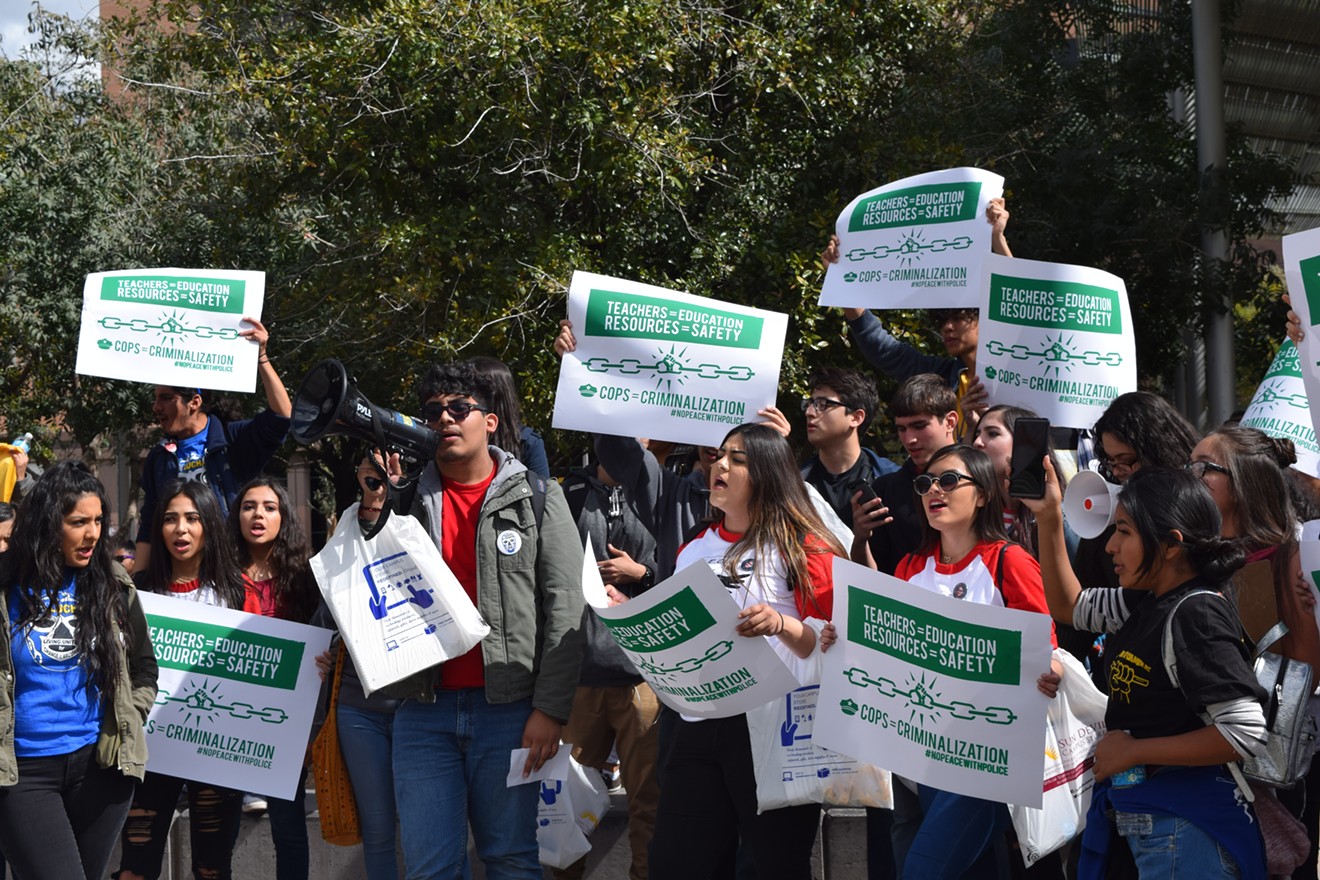Phoenix students organized by two Latino groups marched downtown on Friday, mirroring student demonstrations around the country that erupted after a school shooting in Parkland, Florida, claimed 17 lives.
These students wanted to raise a missing piece in the gun reform debate: More armed personnel in schools would actually make them feel less secure, they said.
“What some people don’t understand is that when we see a police officer, to some of us, that isn’t safety,” Milagros Renteria, a 15-year-old student at South Mountain High School, said at the gathering.
Around 30 students showed up to march from Monroe Street to Civic Square Park. Puente Arizona and MEChA, or Movimiento Estudiantil Chicanx de Aztlán, organized the rally. In addition to gun violence, the students said other problems are absent from the debate, including on-campus police officers, also known as school resource officers, and the zero-tolerance discipline policies they enforce.
Officers are common in the Phoenix Union High School District. Renteria said the presence of officers at her high school combined with Arizona’s extreme anti-immigrant law SB 1070 creates a cloud of anxiety. The state law requires police to ask about the immigration status of people suspected of a crime.
The Phoenix Police Department revised its rules in 2017: “SROs or any other officers must not ask immigration questions or contact ICE for any purposes while on school grounds," the policy states. But it’s not that easy. Any discipline for an undocumented student that stems from contact with police on-campus could theoretically be grounds for deportation under President Trump’s immigration orders.
Schools shouldn’t be a place where students are under surveillance, putting them and their family at risk, Renteria explained.
“I have to go to school five days a week and see a police officer watching my every move, waiting for me to do something wrong,” Renteria told the crowd. “And even then, right when I walk off campus, they could ask me for papers.”
An enhanced police presence in schools could bring undocumented students in contact with the U.S. Immigration and Customs Enforcement Bureau (ICE), they say, risking deportation. And the disproportionate discipline rates for students of color, not to mention implicit racial bias, makes some people extremely uneasy with adding police officers or the idea of arming teachers, as President Donald Trump suggested.
Schools that rely on resource officers for discipline can kick students into the justice system when they’re arrested at school for a relatively minor infractions, such as disruptive behavior.
That process of police discipline in schools kicks off a school-to-prison pipeline, where students of color are heavily impacted, getting pushed out of schools as a result of zero-tolerance policies for school-based infractions. If the school had more resources, such as counselors, it’s possible that the disciplinary problem might have been solved at the outset — no officer required.
In the aftermath of the Parkland shooting, organizers in Phoenix said that this perspective was mostly missing in the national debate about school safety and an epidemic of gun violence.
“There was a particular type of violence that was not being shared in media,” Leidy Robledo, an organizer with Puente Arizona, told the assembled students through a megaphone as the march began at ASU’s downtown campus. As activists, they wanted to join the conversation so that “whatever the solutions are, it’s not our young people paying the price,” Robledo said.
Puente in particular has made the issue of cops in Arizona schools an organizing cause. The immigrant-rights group’s #CopsOuttaCampus campaign began in Spring 2017, around the same time the Phoenix Police Department slowly moved toward revising its policy related to SROs and SB 1070.
Chrisalma Enriquez, a 16-year-old sophomore at South Mountain High School, told Phoenix New Times that she wants to see education funds go toward counselors and ethnic studies courses instead of the officers that she sees walking around on campus.
“To me, it makes me feel like we’re criminals, or animals,” she said.
As the rally wound down and students prepared to catch a ride back to their campus, one of the organizers unfurled a sign on the pavement. In large black letters at the top, it said, “Beyond gun control, students need …” Below, students wrote their responses in colored marker: “A life without discrimination,” “Updated history textbooks,” “Teachers getting decent salaries.”
[
{
"name": "Air - MediumRectangle - Inline Content - Mobile Display Size",
"component": "18478561",
"insertPoint": "2",
"requiredCountToDisplay": "2"
},{
"name": "Editor Picks",
"component": "16759093",
"insertPoint": "4",
"requiredCountToDisplay": "1"
},{
"name": "Inline Links",
"component": "17980324",
"insertPoint": "8th",
"startingPoint": 8,
"requiredCountToDisplay": "7",
"maxInsertions": 25
},{
"name": "Air - MediumRectangle - Combo - Inline Content",
"component": "16759092",
"insertPoint": "8th",
"startingPoint": 8,
"requiredCountToDisplay": "7",
"maxInsertions": 25
},{
"name": "Inline Links",
"component": "17980324",
"insertPoint": "8th",
"startingPoint": 12,
"requiredCountToDisplay": "11",
"maxInsertions": 24
},{
"name": "Air - Leaderboard Tower - Combo - Inline Content",
"component": "16759094",
"insertPoint": "8th",
"startingPoint": 12,
"requiredCountToDisplay": "11",
"maxInsertions": 24
}
]












